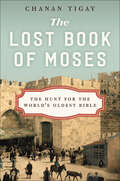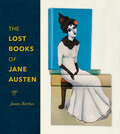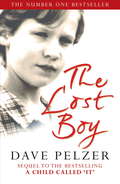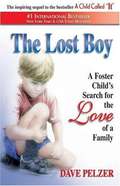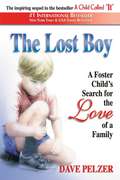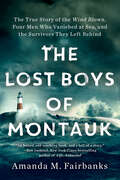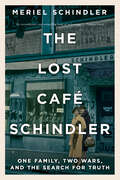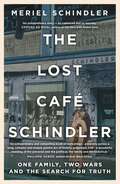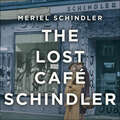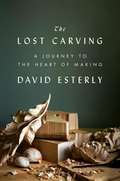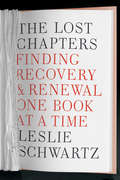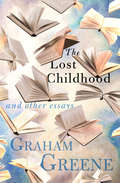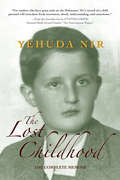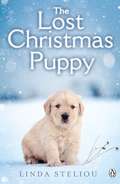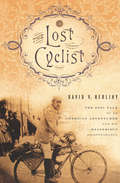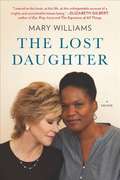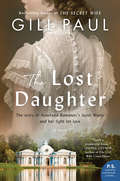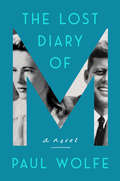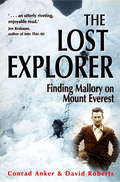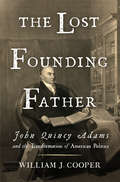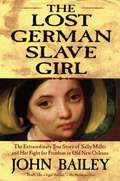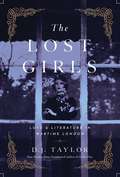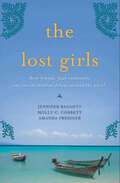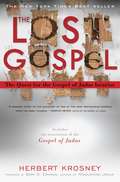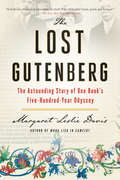- Table View
- List View
The Lost Book of Moses: The Hunt for the World's Oldest Bible
by Chanan TigayA gripping account of one man’s quest to find the world’s oldest Bible and learn about the brilliant, doomed antiquities dealer accused of forging it.In 1883, Moses Wilhelm Shapira—archaeological treasure hunter, inveterate social climber, and denizen of Jerusalem’s bustling marketplace—arrived unannounced in London claiming to have discovered the world’s oldest Bible scroll in a desert cave east of the Dead Sea. With his phenomenal find, Shapira swiftly became world famous—but, just as quickly, his scroll was discredited as a clever forgery. With the discovery of the eerily similar Dead Sea Scrolls in 1947, however, investigators reopened the case, wondering whether Shapira had, in fact, discovered the first Dead Sea Scroll, seven decades before the rest. Here, in a globetrotting narrative with all the suspense of a classic detective story, award-winning journalist Chanan Tigay sets out to find the scrolls and determine Shapira’s guilt or innocence for himself.
The Lost Books of Jane Austen
by Janine BarchasHardcore bibliography meets Antiques Roadshow in an illustrated exploration of the role that cheap reprints played in Jane Austen's literary celebrity—and in changing the larger book world itself.Gold Winner of the 2019 Foreword INDIES Award for History by FOREWORD ReviewsIn the nineteenth century, inexpensive editions of Jane Austen's novels targeted to Britain's working classes were sold at railway stations, traded for soap wrappers, and awarded as school prizes. At just pennies a copy, these reprints were some of the earliest mass-market paperbacks, with Austen's beloved stories squeezed into tight columns on thin, cheap paper. Few of these hard-lived bargain books survive, yet they made a substantial difference to Austen's early readership. These were the books bought and read by ordinary people. Packed with nearly 100 full-color photographs of dazzling, sometimes gaudy, sometimes tasteless covers, The Lost Books of Jane Austen is a unique history of these rare and forgotten Austen volumes. Such shoddy editions, Janine Barchas argues, were instrumental in bringing Austen's work and reputation before the general public. Only by examining them can we grasp the chaotic range of Austen's popular reach among working-class readers. Informed by the author's years of unconventional book hunting, The Lost Books of Jane Austen will surprise even the most ardent Janeite with glimpses of scruffy survivors that challenge the prevailing story of the author's steady and genteel rise. Thoroughly innovative and occasionally irreverent, this book will appeal in equal measure to book historians, Austen fans, and scholars of literary celebrity.
The Lost Boy
by Dave PelzerDave Pelzer's sequel to million-copy bestseller A CHILD CALLED 'IT'As a child, Dave Pelzer was brutally beaten and starved by his mother. The world knew nothing of his living nightmare and he had nothing and no one to turn to. But his dreams kept him alive - dreams of someone taking care of him, loving him and calling him their son. Finally, his horrific plight could no longer be hidden from the outside world and Dave's life radically changed.THE LOST BOY is the harrowing, but ultimately uplifting true story of a boy's journey through the foster-care system in search of a family to love. The continuation of Dave Pelzer's story is a moving sequel and inspirational read for all.
The Lost Boy: A Foster Child's Search for the Love of a Family
by Dave PelzerImagine a young boy who has never had a loving home. His only possessions are the old, torn clothes he carries in a paper bag. The only world he knows is one of isolation and fear. Although others had rescued this boy from his abusive alcoholic mother, his real hurt is just beginning -- he has no place to call home. This is Dave Pelzer's long-awaited sequel to A Child Called "It". In The Lost Boy, he answers questions and reveals new adventures through the compelling story of his life as an adolescent. Now considered an F-Child (Foster Child), Dave is moved in and out of five different homes. He suffers shame and experiences resentment from those who feel that all foster kids are trouble and unworthy of being loved just because they are not part of a "real" family. Tears, laughter, devastation and hope create the journey of this little lost boy who searches desperately for just one thing -- the love of a family.
The Lost Boy: A Foster Child's Search for the Love of a Family (Windsor Selection Ser.)
by Dave PelzerImagine a young boy who has never had a loving home. His only possesions are the old, torn clothes he carries in a paper bag. The only world he knows is one of isolation and fear. Although others had rescued this boy from his abusive alcoholic mother, his real hurt is just begining -- he has no place to call home. This is Dave Pelzer's long-awaited sequel to A Child Called "It". In The Lost Boy, he answers questions and reveals new adventures through the compelling story of his life as an adolescent. Now considered an F-Child (Foster Child), Dave is moved in and out of five different homes. He suffers shame and experiences resentment from those who feel that all foster kids are trouble and unworthy of being loved just because they are not part of a "real" family. Tears, laughter, devastation and hope create the journey of this little lost boy who searches desperately for just one thing -- the love of a family.
The Lost Boys of Montauk: The True Story of the Wind Blown, Four Men Who Vanished at Sea, and the Survivors They Left Behind
by Amanda M. FairbanksAn immersive account of a tragedy at sea whose repercussions haunt its survivors to this day, lauded by New York Times bestselling author Ron Suskind as &“an honest and touching book, and a hell of a story.&”In March of 1984, the commercial fishing boat Wind Blown left Montauk Harbor on what should have been a routine offshore voyage. Its captain, a married father of three young boys, was the boat&’s owner and leader of the four-man crew, which included two locals and the blue-blooded son of a well-to-do summer family. After a week at sea, the weather suddenly turned, and the foursome collided with a nor&’easter. They soon found themselves in the fight of their lives. Tragically, it was a fight they lost. Neither the boat nor the bodies of the men were ever recovered. The fate of the Wind Blown—the second-worst nautical disaster suffered by a Montauk-based fishing vessel in over a hundred years—has become interwoven with the local folklore of the East End&’s year-round population. Back then, on the easternmost tip of Long Island, before Wall Street and hedge fund money stormed into town, commercial fishing was the area&’s economic lifeblood. Amanda M. Fairbanks examines the profound shift of Montauk from a working-class village—&“a drinking town with a fishing problem&”—to a playground for the ultra-wealthy, seeking out the reasons that an event more than three decades old remains so startlingly vivid in people&’s minds. She explores the ways in which deep, lasting grief can alter people&’s memories. And she shines a light on the powerful and sometimes painful dynamics between fathers and sons, as well as the secrets that can haunt families from beyond the grave. The story itself is a universal tale of family and brotherhood; it&’s about what happens when the dreams and ambitions of affluent and working-class families collide. Captivating and powerful, The Lost Boys of Montauk explores one of the most important questions we face as humans: how do memories of the dead inform the lives of those left behind?
The Lost Café Schindler: One Family, Two Wars, And The Search For Truth
by Meriel Schindler"An extraordinary and compelling book of reckonings." —Philippe Sands An extraordinary memoir of a Jewish family spanning two world wars and its flight from Nazi-occupied Austria. Meriel Schindler spent her adult life trying to keep her father, Kurt, at bay. But when he died in 2017, he left behind piles of Nazi-era documents related to her family’s fate in Innsbruck, Austria, and a treasure trove of family albums reaching back to before World War I. Meriel was forced to confront not only their fractured relationship, but also the truth behind their family history. The Lost Café Schindler re-creates the journey of an extraordinary family, whose relatives included the Jewish doctor who treated Hitler’s mother when she was dying of breast cancer; the Kafka family; and Alma Schindler, the wife of Gustav Mahler. The narrative centers around the Café Schindler, the social hub of Innsbruck. Famous for its pastries, home-distilled liquors, live entertainment, and hospitality, the restaurant attracted Austrians from all walks of life. But as conditions became untenable for Jews in Austria during the Nazi era, the Schindlers were forced to leave, and their café was expropriated. Meriel reconstructs the color and vibrancy of life in prewar Innsbruck against the majestic backdrop of the Austrian Alps, as well as the creeping menace and, finally, terror of the Nazi occupation. Ultimately, The Lost Café Schindler is a story of tragic loss—several relatives disappeared in Terezín and Auschwitz—but also one of reclamation and reconciliation. Beautifully written, it is an unforgettable portrait of an era and a testament to the pull of family history on future generations.
The Lost Café Schindler: One family, two wars and the search for truth
by Meriel Schindler'Rigorously researched, The Lost Café Schindler successfully weaves together a compelling and at times deeply moving memoir and family history that also chronicles the wider story of the Jews of the Austro-Hungarian Empire... It distinguishes itself through its combination of mystery and reconciliation.' -- The Times T2'In tilling the past Meriel has uncovered the most fascinating - and devastating - family history. The Lost Cafe Schindler is not just a genealogical exploration, though; it sets out the wider experiences of the Jewish population of the Austro-Hungarian empire, weaving in the story of how antisemitism took root' -- Sunday Times'An impressively researched account of Jewish life in the Tyrol up to and during the Second World War' -- Evening Standard'An extraordinary story - so cadenced and so moving.' -- Edmund de Waal, author of The Hare with Amber Eyes'An extraordinary and compelling book of reckonings - a journey across a long, complex and deeply painful arc of history, grippingly told - a wonderful melding of the personal and the political, the family and the historical.' -- Philippe Sands, author of East West Street'A significant benefit for family historians is that her reading, sources and resources offer guidance that others might follow and use in their own research.' Who Do You Think You Are?'A well-researched account.' -- The Observer'The scale of the crimes committed during these years can never be fully comprehended, but through tales like these they become relatable and the sense of loss, shared.' -- Press Association'Compelling and beautifully written... a remarkable and inspiring story that attests to the strength and compassion of the human spirit in overcoming the tragedy of persecution... Fascinating family history.' - Daily Express'Schindler builds her story patiently, tracking her own journey in unravelling it' - i***Kurt Schindler was an impossible man. His daughter Meriel spent her adult life trying to keep him at bay. Kurt had made extravagant claims about their family history. Were they really related to Franz Kafka and Oscar Schindler, of Schindler's List fame? Or Hitler's Jewish doctor - Dr Bloch? What really happened on Kristallnacht, the night that Nazis beat Kurt's father half to death and ransacked the family home? When Kurt died in 2017, Meriel felt compelled to resolve her mixed feelings about him, and to solve the mysteries he had left behind. Starting with photos and papers found in Kurt's isolated cottage, Meriel embarked on a journey of discovery taking her to Austria, Italy and the USA. She reconnected family members scattered by feuding and war. She pieced together an extraordinary story taking in two centuries, two world wars and a family business: the famous Café Schindler. Launched in 1922 as an antidote to the horrors of the First World War, this grand café became the whirling social centre of Innsbruck. And then the Nazis arrived. Through the story of the Café Schindler and the threads that spool out from it, this moving book weaves together memoir, family history and an untold story of the Jews of the Austro-Hungarian Empire. It explores the restorative power of writing, and offers readers a profound reflection on memory, truth, trauma and the importance of cake.
The Lost Café Schindler: One family, two wars and the search for truth
by Meriel SchindlerKurt Schindler was an impossible man. His daughter Meriel spent her adult life trying to keep him at bay. Kurt had made extravagant claims about their family history. Were they really related to Franz Kafka and Oscar Schindler, of Schindler's List fame? Or Hitler's Jewish doctor - Dr Bloch? What really happened on Kristallnacht, the night that Nazis beat Kurt's father half to death and ransacked the family home? When Kurt died in 2017, Meriel felt compelled to resolve her mixed feelings about him, and to solve the mysteries he had left behind. Starting with photos and papers found in Kurt's isolated cottage, Meriel embarked on a journey of discovery taking her to Austria, Italy and the USA. She reconnected family members scattered by feuding and war. She pieced together an extraordinary story taking in two centuries, two world wars and a family business: the famous Café Schindler. Launched in 1922 as an antidote to the horrors of the First World War, this grand café became the whirling social centre of Innsbruck. And then the Nazis arrived. Through the story of the Café Schindler and the threads that spool out from it, this moving book weaves together memoir, family history and an untold story of the Jews of the Austro-Hungarian Empire. It explores the restorative power of writing, and offers readers a profound reflection on memory, truth, trauma and the importance of cake.(P) 2021 Hodder & Stoughton Ltd
The Lost Carving
by David Esterly"A beautiful, intricate meditation on creativity and discovery, on fire and rebirth. ” -Elizabeth Gilbert Awestruck at the sight of a Grinling Gibbons carving in a London church, David Esterly chose to dedicate his life to woodcarving-its physical rhythms, intricate beauty, and intellectual demands. Forty years later, he is the foremost practitioner of Gibbons’s forgotten technique, which revolutionized ornamental sculpture in the late 1600s with its spectacular cascades of flowers, fruits, and foliage. After a disastrous fire at Henry VIII’s Hampton Court Palace, Esterly was asked to replace the Gibbons masterpiece destroyed by the flames. It turned out to be the most challenging year in Esterly’s life, forcing him to question his abilities and delve deeply into what it means to make a thing well. Written with a philosopher’s intellect and a poet’s grace, The Lost Carving explores the connection between creativity and physical work and illuminates the passionate pursuit of a vocation that unites head and hand and heart. .
The Lost Chapters: Finding Recovery and Renewal One Book at a Time
by Leslie SchwartzLeslie Schwartz's powerful, skillfully woven memoir of redemption and reading, as told through the list of books she read as she served a 90 day jail sentence In 2014, novelist Leslie Schwartz was sentenced to 90 days in Los Angeles County Jail for a DUI and battery of an officer. It was the most harrowing and holy experience of her life.Following a 414-day relapse into alcohol and drug addiction after more than a decade clean and sober, Schwartz was sentenced and served her time with only six months' sobriety. The damage she inflicted that year upon her friends, her husband, her teenage daughter, and herself was nearly impossible to fathom. Incarceration might have ruined her altogether, if not for the stories that sustained her while she was behind bars--both the artful tales in the books she read while there, and, more immediately, the stories of her fellow inmates. With classics like Edith Wharton's Ethan Frome to contemporary accounts like Laura Hillenbrand's Unbroken, Schwartz's reading list is woven together with visceral recollections of both her daily humiliations and small triumphs within the county jail system. Through the stories of others--whether rendered on the page or whispered in a jail cell--she learned powerful lessons about how to banish shame, use guilt for good, level her grief, and find the lost joy and magic of her astonishing life. Told in vivid, unforgettable prose, The Lost Chapters uncovers the nature of shame, rage, and love, and how instruments of change and redemption come from the unlikeliest of places.
The Lost Childhood: And Other Essays
by Graham GreeneFrom Dickens to Wilde—literary criticism and personal reflections by a master &“unmatched . . . in his uncanny psychological insights&” (The New York Times). Graham Greene shares his love affair with reading in this collection of essays, memories, and critical considerations, both affectionate and tart, &“[that] could have come from no other source than the author of Brighton Rock and The Power and the Glory&” (The Scotsman). Whether following the obsessions of Henry James, marveling at the &“indispensible&” Beatrix Potter, or exploring the Manichean world of Oliver Twist, Graham Greene revisits the books and authors of his lifetime. Here is Greene on Fielding, Doyle, Kipling, and Conrad; on The Prisoner of Zenda and the &“revolutionary . . . colossal egoism&” of Laurence Stern&’s epic comic novel, Tristram Shandy; on the adventures of both Allan Quatermain and Moll Flanders; and more. Greene strolls among the musty oddities and folios sold on the cheap at an outdoor book mart, tells of a bizarre literary hoax perpetrated on a hapless printseller in eighteenth-century Pall Mall, and in the titular essay, reveals the book that unlocked his imagination so thoroughly that he decided to write forever. For Greene, &“all the other possible futures slid away.&” In this prismatic gallery of profound influences and guiltless pleasures, Greene proves himself &“so intensely alive that the reader cannot but respond to the dazzling combination of intelligence and strong feeling&” (Edward Sackville West).
The Lost Childhood: The Complete Memoir
by Yehuda NirThis compelling memoir takes readers through the eyes of a child surviving World War II in Nazi-occupied Poland. As a nine-year-old, the author witnessed his father being herded into a truck—never to be seen again. He, his mother, and sister fled to Warsaw to live in disguise as Catholics under the noses of the Nazi SS, constantly fearful of discovery and persecution. A sobering reminder of the personal toll of the Holocaust on Jews during World War II, this book is a harrowing portrait of one child's loss of innocence. This edition contains previously unpublished content from the original text.
The Lost Christmas Puppy
by Linda SteliouLittle Linda was three years old when she told Father Christmas a secret. 'What I want more than anything is to have a puppy of my own to love'. But with every Christmas that went by, no puppy appeared. Linda grew into a busy working mum and wife, and her dreams of a puppy were pushed to the back of her mind. It wasn't until a special visitor one Christmas Eve, that she began to remember the wish she had made sixty years earlier. . .Fans of Christmas at the Ragdoll Orphanage and The Lost Christmas Puppy will love this book full of charming and touching stories. This is an unforgettable true story about childhood, love, and how an animal can change anyone's life.
The Lost Cyclist: The Epic Tale of an American Adventurer and His Mysterious Disappearance
by David V. HerlihyThis &“fascinating&” story of a nineteenth-century mystery &“should appeal to most lovers of history, as well as to bicycling enthusiasts. Strongly recommended&” (Library Journal). In the late 1880s, Frank Lenz of Pittsburgh, a renowned high-wheel racer and long-distance tourist, dreamed of cycling around the world. He finally got his chance by recasting himself as a champion of the downsized &“safety-bicycle&” with inflatable tires, the forerunner of the modern road bike that was about to become wildly popular. In the spring of 1892 he quit his accounting job and gamely set out west to cover twenty thousand miles over three continents as a correspondent for Outing magazine. Two years later, after having survived countless near disasters and unimaginable hardships, he approached Europe for the final leg. Lenz never made it. His mysterious disappearance in eastern Turkey sparked an international outcry and compelled Outing to send William Sachtleben, another larger-than-life cyclist, on Lenz&’s trail. Bringing to light a wealth of information, David Herlihy&’s gripping narrative captures the soaring joys and constant dangers accompanying the bicycle adventurer in the days before paved roads and automobiles. This untold story culminates with Sachtleben&’s heroic effort to bring Lenz&’s accused murderers to justice, even as troubled Turkey teetered on the edge of collapse.
The Lost Daughter
by Mary WilliamsA daughter of the Black Panther movement tells her remarkable life story of being raised amid violence and near-poverty, adopted as a teenager by Jane Fonda, and finding her way back home. As she grew up in 1970s Oakland, California, role models for Mary Williams were few and far between: her father was often in prison, her older sister was a teenage prostitute, and her hot-tempered mother struggled to raise six children alone. When Mary was thirteen, a silver lining appeared in her life: she was invited to spend a summer at Laurel Springs Children's Camp, run by Jane Fonda and her then husband, Tom Hayden. Mary flourished at camp, and over the course of several summers, she began confiding in Fonda about her difficulties at home. During one school year, Mary suffered a nightmare assault crime, which she kept secret until she told a camp counselor and Fonda. After providing care and therapy for Mary, Fonda invited her to come live with her family. Practically overnight, Mary left the streets of Oakland for the star-studded climes of Santa Monica. Jane Fonda was the parent Mary had never had--outside the limelight and Hollywood parties, Fonda was a wonderful mom who helped with homework, listened to adolescent fears, celebrated achievements, and offered inspiration and encouragement at every turn. Mary's life since has been one of adventure and opportunity--from hiking the Appalachian Trail solo, working with the Lost Boys of Sudan, and living in the frozen reaches of Antarctica. Her most courageous trip, though, involved returning to Oakland and reconnecting with her biological mother and family, many of whom she hadn't seen since the day she left home. The Lost Daughter is a chronicle of her journey back in time, an exploration of fractured family bonds, and a moving epic of self-discovery.
The Lost Daughter: A Novel
by Gill PaulIf you loved I Am Anastasia by Ariel Lawhon you won't want to miss this novel about her sister, Grand Duchess Maria. What really happened to this lost Romanov daughter? A new novel perfect for anyone curious about Anastasia, Maria, and the other lost Romanov daughters, by the author of The Secret Wife. 1918: Pretty, vivacious Grand Duchess Maria Romanov, the nineteen-year-old daughter of the fallen Tsar Nicholas II, lives with her family in suffocating isolation, a far cry from their once-glittering royal household. Her days are a combination of endless boredom and paralyzing fear; her only respite are clandestine flirtations with a few of the guards imprisoning the family—never realizing her innocent actions could mean the difference between life and death1973: When Val Doyle hears her father’s end-of-life confession, “I didn’t want to kill her,” she’s stunned. So, she begins a search for the truth—about his words and her past. The clues she discovers are baffling—a jewel-encrusted box that won’t open and a camera with its film intact. What she finds out pulls Val into one of the world’s greatest mysteries—what truly happened to the Grand Duchess Maria?
The Lost Diary of M: A Novel
by Paul Wolfe“Great fun for conspiracy theorists and romantics alike,” this “riveting” historical novel imagines the life—and unsolved murder—of JFK’s mistress (People).An engrossing debut novel that cannily reimagines the extraordinary life and mysterious death of bohemian Georgetown socialite Mary Pinchot Meyer— secret lover of JFK, ex-wife of a CIA chief, sexual adventurer, LSD explorer and early feminist living by her own rules.She was a longtime lover of JFK.She was the ex-wife of a CIA chief. She was the sister-in-law of the Washington Post’s Ben Bradlee.She believed in mind expansion and took LSD with Timothy Leary. She was a painter, a socialite and a Bohemian in Georgetown during the Cold War.And she ended up dead in an unsolved crime a year after JFK’s assassination.The diary she kept was never found.Until now. . . . “Devilishly creative.” —Kitty Kelley author of Jackie Oh! and The Family: The Real Story of the Bush Dynasty“In this novel that is part love story, part thriller and 100% page turner, Paul Wolfe takes you inside the sexual playgrounds of Cold War Washington.” —Sally Koslow, author of Another Side of Paradise“A compassionate and intricate portrait. . . . Wolfe’s inspired study of a cryptic woman is credible and haunting.” —Booklist, starred review“The author deftly simulates a complicated woman’s diary, creating a document that feels entirely authentic. . . . shedding light on a woman with a front seat to American history.” —Kirkus Reviews“This imagined diary . . . simmers with intrigue and sensuality, painting in vivid colors both the magnificence and dark underbelly of Camelot” — Newsweek
The Lost Explorer: Finding Mallory on Mount Everest
by David Roberts Conrad AnkerIn 1999, Conrad Anker found the body of George Mallory on Mount Everest, casting an entirely new light on the mystery of the lost explorer.On 8 June 1924, George Leigh Mallory and Andrew 'Sandy' Irvine were last seen climbing towards the summit of Everest. The clouds closed around them and they were lost to history, leaving the world to wonder whether or not they actually reached the summit - some 29 years before Edmund Hillary and Tensing Norgay.On 1 May 1999, Conrad Anker, one of the world's foremost mountaineers, made the momentous discovery - Mallory's body, lying frozen into the scree at 27,000 feet on Everest's north face. Recounting this day, the authors go on to assess the clues provided by the body, its position, and the possibility that Mallory had successfully climbed the Second Step, a 90-foot sheer cliff that is the single hardest obstacle on the north face. A remarkable story of a charming and immensely able man, told by an equally talented modern climber.
The Lost Founding Father: John Quincy Adams And The Transformation Of American Politics
by William J. CooperWhy has John Quincy Adams been largely written out of American history when he is, in fact, our lost Founding Father? Long relegated to the sidelines of history as the hyperintellectual son of John and Abigail Adams, John Quincy Adams (1767–1848), has never basked in the historical spotlight. Remembered, if at all, as an ineffective president during an especially rancorous time, Adams was humiliated in office after the contested election of 1824, viciously assailed by populist opponents for being both slippery and effete, and then resoundingly defeated by the western war hero Andrew Jackson, whose 1828 election ushered in an era of unparalleled expansion. Aware of this reputation yet convinced that Adams deserves a reconsideration, award-winning historian William J. Cooper has reframed the sixth president’s life in an entirely original way, demonstrating that Adams should be considered our lost Founding Father, his morality and political philosophy the final link to the great visionaries who created our nation. As Cooper demonstrates, no one else in his generation—not Clay, Webster, Calhoun, or Jackson—ever experienced Europe as young Adams did, who at fourteen translated from French at the court of Catherine the Great. In fact, Adams’s very exposure to the ideas of the European Enlightenment that had so influenced the Founding Fathers, including their embrace of reason, were hardly shared by his contemporaries, particularly those who could not countenance slaves as equal human beings. Such differences, as Cooper narrates, became particularly significant after Adams’s failed presidency, when he, along with his increasingly reclusive wife, Louisa Catherine Adams, returned to Washington as a Massachusetts congressman in 1831. With his implacable foe Andrew Jackson in the White House, Adams passionately took up the antislavery cause. Despite raucous opposition from southern and northern politicians, Adams refused to relent, his protests so vehement that Congress enacted the gag rule in the 1830s specifically to silence him. With his impassioned public pronouncements and his heroic arguments in the Amistad trial, a defiant Adams was no longer viewed as a failed president but a national, albeit curmudgeonly, hero, who finally collapsed on the floor of the House chamber in 1848 and died in the capital three days later. Ironically, Adams’s death and the extraordinary obsequies produced an outpouring of national, and bipartisan, grief never before seen in the nineteenth century, as if the country had truly lost its last Founding Father. Now, in another fractious age, the courageous life of John Quincy Adams suddenly takes on renewed vigor and meaning, as William J. Cooper’s momentous biography so eloquently affirms.
The Lost German Slave Girl: The Extraordinary True Story Of The Slave Sally Miller And Her Fight For Freedom In Old New Orleans
by John BaileyIt is a spring morning in New Orleans, 1843. In the Spanish Quarter, on a street lined with flophouses and gambling dens, Madame Carl recognizes a face from her past. It is the face of a German girl, Sally Miller, who disappeared twenty-five years earlier. But the young woman is property, the slave of a nearby cabaret owner. She has no memory of a "white" past. Yet her resemblance to her mother is striking, and she bears two telltale birthmarks. In brilliant novelistic detail, award-winning historian John Bailey reconstructs the exotic sights, sounds, and smells of mid-nineteenth-century New Orleans, as well as the incredible twists and turns of Sally Miller's celebrated and sensational case. Did Miller, as her relatives sought to prove, arrive from Germany under perilous circumstances as an indentured servant or was she, as her master claimed, part African, and a slave for life? A tour de force of investigative history that reads like a suspense novel, The Lost German Slave Girl is a fascinating exploration of slavery and its laws, a brilliant reconstruction of mid-nineteenth-century New Orleans, and a riveting courtroom drama. It is also an unforgettable portrait of a young woman in pursuit of freedom.
The Lost Girls: Love And Literature In Wartime London
by D. J. TaylorThe Booker Prize–nominated author of Derby Day delivers a sumptuous cultural history as seen through the lives of four enigmatic women. Who were the Lost Girls? Chic, glamorous, and bohemian, as likely to be found living in a rat-haunted maisonette as dining at the Ritz, Lys Lubbock, Sonia Brownell, Barbara Skelton, and Janetta Parlade cut a swath through English literary and artistic life at the height of World War II. Three of them had affairs with Lucian Freud. One of them married George Orwell. Another became the mistress of the King of Egypt. They had very different—and sometimes explosive—personalities, but taken together they form a distinctive part of the wartime demographic: bright, beautiful, independent-minded women with tough upbringings who were determined to make the most of their lives in a chaotic time. Ranging from Bloomsbury and Soho to Cairo and the couture studios of Schiaparelli and Hartnell, the Lost Girls would inspire the work of George Orwell, Evelyn Waugh, Anthony Powell, and Nancy Mitford. They are the missing link between the Lost Generation and Bright Young People and the Dionysiac cultural revolution of the 1960s. Sweeping, passionate, and unexpectedly poignant, this is their untold story.
The Lost Girls: Three Friends. Four Continents. One Unconventional Detour Around the World.
by Jennifer Baggett Holly C. Corbett Amanda PressnerThree friends, each on the brink of a quarter-life crisis, embark on a year-long backpacking adventure around the world in The Lost Girls.“A triumphant journey about losing yourself, finding yourself and coming home again. Hitch yourself to their ride: you’ll embark on a transformative journey of your own.” —New York Times bestselling author Allison Winn ScotchWith their thirtieth birthdays looming, Jennifer Baggett, Holly C. Corbett, and Amanda Pressner are feeling the pressure to hit certain milestones—score the big promotion, find a soul mate, have 2.2 kids. Instead, they make a pact to quit their high-pressure New York City media jobs and leave behind their friends, boyfriends, and everything familiar to set out on a journey in search of inspiration and direction.Traveling 60,000 miles across four continents, Jen, Holly, and Amanda push themselves far outside their comfort zones to embrace every adventure. Ultimately, theirs is a story of true friendship—a bond forged by sharing beds and backpacks, enduring exotic illnesses, trekking across mountains, and standing by one another through heartaches, whirlwind romances, and everything in the world in between. “A real-life fairy tale for anyone who’s ever wanted to chuck it all and see the world with a best friend on each arm.” —Cathy Alter, author of Up for Renewal“Three cheers to The Lost Girls for showing us, with good humor and graceful prose, the beauty and importance of leading life astray.” —New York Times bestselling author Franz Wisner
The Lost Gospel: The Quest for the Gospel of Judas Iscariot
by Herbert KrosneyA writer and documentary filmmaker based in New York and Jerusalem, Krosney describes how Egyptian peasants discovered a bound papyrus book in Coptic near the Nile in the middle to late 1970s that was identified in 2000 as the Gospel of Judas Iscariot, which was mentioned by some early Christians but condemned 1,800 years ago. It has been radio-carbon dated at 220-340 +/- 60 years. He includes quotations from the text, but the text itself was published as The Gospel of Judas (ISBN 1-4262-0042-0), which was the first modern translation of the ancient Coptic document. Annotation ©2007 Book News, Inc. , Portland, OR (booknews. com)
The Lost Gutenberg: The Astounding Story of One Book's Five-Hundred-Year Odyssey
by Margaret Leslie Davis"An addictive and engaging look at the ‘competitive, catty and slightly angst-ridden’ heart of the world of book collecting.” - The Houston Chronicle The never-before-told story of one extremely rare copy of the Gutenberg Bible, and its impact on the lives of the fanatical few who were lucky enough to own it.For rare-book collectors, an original copy of the Gutenberg Bible--of which there are fewer than 50 in existence--represents the ultimate prize. Here, Margaret Leslie Davis recounts five centuries in the life of one copy, from its creation by Johannes Gutenberg, through the hands of monks, an earl, the Worcestershire sauce king, and a nuclear physicist to its ultimate resting place, in a steel vault in Tokyo. Estelle Doheny, the first woman collector to add the book to her library and its last private owner, tipped the Bible onto a trajectory that forever changed our understanding of the first mechanically printed book.The Lost Gutenberg draws readers into this incredible saga, immersing them in the lust for beauty, prestige, and knowledge that this rarest of books sparked in its owners. Exploring books as objects of obsession across centuries, this is a must-read for history buffs, book collectors, seekers of hidden treasures, and anyone who has ever craved a remarkable book--and its untold stories.
